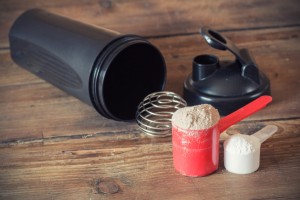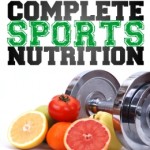Performance Nutrition: Fuel Like a Champion!
By: Christopher R. Mohr, PhD, RD
Young athletes have very unique demands – school, sports, and training.
But even in the busy world of a young athlete, there is a way to improve each of those 3 things – by Fueling like a Champion.
Let’s delve a bit into some specific nutrition tips for young athletes.
Carbohydrates
 Carbohydrates should absolutely be the cornerstone of a player diet. The key, is to focus heavily on quality — “think fiber, not carbs!” There is a huge difference between white bread and whole grain, high fiber bread; a sugar coated cereal and oatmeal; French fries vs. sweet potatoes. Focus on the quality of the carbohydrates
Carbohydrates should absolutely be the cornerstone of a player diet. The key, is to focus heavily on quality — “think fiber, not carbs!” There is a huge difference between white bread and whole grain, high fiber bread; a sugar coated cereal and oatmeal; French fries vs. sweet potatoes. Focus on the quality of the carbohydrates
For example, definitely eat breakfast, but try a whole grain based cereal with some fresh fruit for the nutrients and fiber. Something like oatmeal instead of Fruit Loops or Cheerios vs. Cocoa Pebbles.
Sandwiches should be made with whole grain bread, rather than their white counterpart. Snacks can be whole grain crackers with peanut butter, fruit or veggie sticks with peanut butter, etc. The list can go on.
The focus of carbohydrates should always be on foods that provide a few grams of fiber per serving (exception is milk and yogurt, which are very healthy and carbohydrate based, but provide little, if any fiber).
Fruit and vegetables are also a crucial element for a high performance athlete. Kids often shy away from them and parents don’t always push them. However, research has suggested it can take as many as one dozen times to determine if a child likes a particular food. The key for a parent is to introduce kids to as many of these nutrient dense, colorful foods as possible! Make it fun.
Here are a few ideas:
- Ants on a log (celery with natural peanut butter and raisins)
- Sailboats (apple slices with toothpicks holding a cheddar cheese “sail”— of course watch your child to ensure they don’t eat the toothpick).
- Homemade trail mix (mixed nuts, dried fruit, and some whole grain cereal)
Keep in mind that dried fruit counts towards the total fruit intake for the day, as does 100% juice (of course this shouldn’t be the mainstay, though, as whole fruit provides more fiber), along with fruit puree.
Protein Needs of Players
In the world of athletics, no other macronutrient has received the same level of attention as protein.
Of course protein plays a role and a very important one at that! One important message is to make sure you always focus on food first – not protein supplements. High quality protein sources include:
- fish and other seafood
- low or non fat milk or yogurt
- chicken and turkey breast
- lean red meat
- mixed nuts
- eggs
- beans
- natural peanut butter
Should young athletes take a protein supplement?
 The better question is:
The better question is:
- Do they need a protein supplement? No.
- Will it make them into the next college or pro athlete? Of course not!
- Can it be beneficial and a healthier option than many of the alternative high sugar, high fat foods marketed directly towards children? Absolutely!
But food first as whole foods provide more nutrients than any supplement does or ever will be able to provide.
Chewing the Fat
Fat is another crucial nutrient for athletes. The key, like with the other macronutrients, is to focus on quality. In fact, there have been a handful of scientific studies to even show that one component of omega-3 fats, DHA, is crucial in terms of brain development. Fat also provides a lot of calories (over double that of protein or carbohydrates), which can be important for very active, young athletes who need more calories than most to develop healthy, strong bodies.
Here are a few fats to choose:
- Fish
- Whole eggs
- Olive oil
- Raw mixed nuts
- Natural peanut butter
- Avocados and more
Don’t overdo the fats, but definitely don’t skimp on them either—moderation and quality is king!
Fluids
These are actually the most important nutrient anyone can consume. The quality of the fluid is a struggle for kids in particular; they are surely drinking more fluids, but not the type we’d encourage. Over the past few decades, milk consumption has decreased dramatically and is being replaced with soft drinks. This is unfortunate because of the nutrients being lost without the milk and the empty calories they’re being replaced with. Remember I mentioned earlier that 100% juice does count as fruit; however, we also don’t want kids to live off this, as it doesn’t provide all the same fiber and nutrients whole fruit does, in addition to being way too easy to over consume. Keep in mind that 4 oz of juice counts as one fruit; this is ½ of a cup of juice. It would be very easy to drink 2 whole cups of juice, but you are less likely to eat the equivalent 4 whole oranges, meaning it is easy to pack in a lot of excess calories.
Water is really the best option. The 2005 Dietary Guidelines do in fact make a recommendation to consume at least 3 servings of low-fat milk or other dairy products, and the majority of other fluids should be water. If you need to make water more exciting for kids, add a squeeze of orange, lemon, lime, or cucumber. And always keep a pitcher in the refrigerator, so there is cold water at their fingertips.
There you have it. Nutrition basics.
In summary, here are a few tips to keep in mind when fueling young athletes.
• Variety is crucial—the more the variety, the better
• The more fruits and vegetables each day, the better
• Think fiber, not carbs
• Protein is absolutely important, just as it is with adults.
• Fat quality is crucial
• Be creative to get kids to eat a variety of foods
• Hydrate, hydrate, hydrate!
• Very basic supplements, such as a high quality protein, are OK, within reason, but the food first approach is always the best with folks of all ages.
Most important, make sure your child has a chance to try a variety of activities, has fun, and enjoys him/herself. At 9 or 10 years old, they are not trying out for the majors; they are trying to play and have fun. Let them be kids, learn some basic skills, and camaraderie; it’s not the Superbowl, World Series, or World Cup! In the meantime, feed them well and teach them positive nutrition habits that will stay with them for life!
Feed your body. It’s a machine. To be the best player, you need to train and eat like the best athlete in the world.
——————————
About the Author:
Dr. Chris Mohr is an expert nutrition consultant for Reebok and was the sports nutritionist consultant for the Cincinnati Bengals, along with being on the board for Men’s Fitness Magazine. He is the creator of Complete Sports Nutrition. If you are looking for a nutrition system for your athletes, then go check out the details on Complete Sports Nutrition here.
Recommended Athletes Acceleration Products
 | |
| Complete Youth Training |




0 Comments for “Nutrition for Sports Performance”